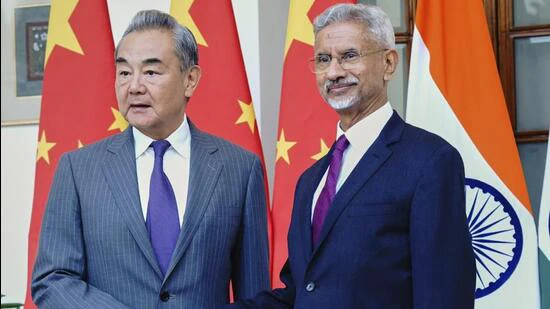There is no change in India’s position on Taiwan, with which New Delhi maintains economic, technology, and cultural ties, people familiar with the matter said on Tuesday, while responding to a Chinese foreign ministry readout that misquoted external affairs minister S Jaishankar as saying that Taiwan is part of China.
The readout, issued only in Mandarin after midnight Indian time following a meeting between Jaishankar and his Chinese counterpart Wang Yi in New Delhi on Monday, contained a lengthy paragraph with comments attributed to the external affairs minister. It included the line: “Taiwan is a part of China.” There was no Chinese readout on the meeting in English.
“There is no change in our position on Taiwan. We stressed that, like the rest of the world, India has a relationship with Taiwan that focuses on economic, technology, and cultural ties,” one of the people cited above said on condition of anonymity. “We intend to continue it [the relationship],” the person added.
During Monday’s meeting, Wang urged the Indian side not to deal with Taiwan, a second person said. Jaishankar responded by questioning how this would be possible when China itself is dealing with Taiwan in the same areas as India, the second person added.
The people said the external affairs minister had been misquoted in the Chinese foreign ministry’s readout. The remarks attributed to Jaishankar were widely reported by China’s state-run media.
Beijing has often insisted that New Delhi should adhere to the “one-China” policy, contending that the Indian side has made political commitments regarding this. The people pointed out that India stopped referring to the “one-China” policy in official documents and pronouncements since 2011, after Chinese authorities issued stapled visas to residents of the border state of Arunachal Pradesh and Jammu and Kashmir.
Wang is the first Chinese minister to visit India since the end of the military face-off between the two countries on the Line of Actual Control (LAC) last October. He is in New Delhi for talks on the border issue under the Special Representatives mechanism with National Security Adviser Ajit Doval.
Doval and Wang are the designated Special Representatives, and the mechanism is the highest body for dealing with the long-standing border dispute.
The visit has assumed greater significance as Prime Minister Narendra Modi is set to visit China for the Shanghai Cooperation Organisation (SCO) Summit on August 31 and September 1 amid strains in India-US relations over the trade and tariff policies of the Donald Trump administration in the US.
India and Taiwan don’t have formal diplomatic relations, though both sides established representative offices in each other’s capitals in 1995. Taiwan has the Taipei Economic and Cultural Center TECC in New Delhi, Chennai, and Mumbai. India has the India-Taipei Association (ITA) office in Taipei. These facilities are responsible for promoting cooperation in trade, investment, science and technology, tourism, and education.
In 2023, two-way trade was worth $8.2 billion. India was the 16th largest trading partner for Taiwan. Taiwan’s exports to India touched $6 billion, positioning the country as its 12th largest export market.
Taiwan has emerged as key to India’s ambitious plans to become a hi-tech manufacturing hub for semiconductors, smartphones, and green products. Tata Group has tied up with Taiwan’s Powerchip Semiconductor Manufacturing Corporation (PSMC) to set up a semiconductor fabrication facility at Dholera in Gujarat. Foxconn Technology Group plays a key role in Apple’s iPhone manufacturing facilities in India.
In June last year, Modi responded to a congratulatory message from Lai Ching-te on his election victory by saying that he looked forward to closer ties between India and Taiwan as “we work towards mutually beneficial economic and technological partnership”.
Lai was among the world leaders who greeted Modi on securing a third term at a time when China’s top leadership was yet to issue a similar message.
